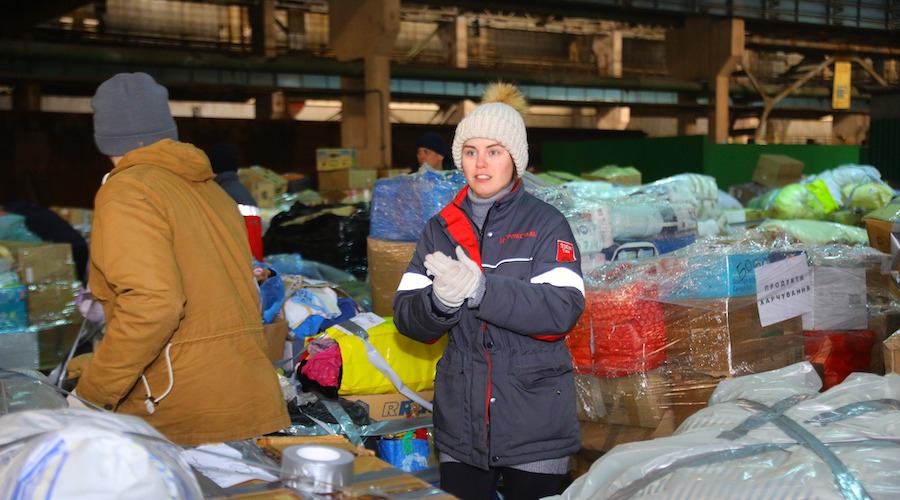
In normal times, Metinvest Holding LLC is all about making and selling steel. But these are not normal times inside Ukraine.
On Saturday, Chief Executive Officer Yuriy Ryzhenkov was focused on yet another attempt to get humanitarian aid into the eastern port city of Mariupol, which has been besieged for weeks by Russian shelling. A convoy of aid trucks and empty buses had just left his company’s steel plant in Zaporizhzhia on the 460 km (285 mile) round trip.
Ryzhenkov said he was optimistic this time would be different, that the convoy would be let through and not shot at. Priests from the Ukrainian Orthodox Church — which answers to the head of the Russian Orthodox Church in Moscow — had become involved, he said, and “they will basically march in front of this convoy.”
President Volodymyr Zelenskiy thanked the priests in an address and his office posted a video of them blessing the aid effort as the convoy prepared to leave Zaporizhzhia. Deputy prime minister Iryna Vereshchuk said the convoy, carrying water, food and medicine, was later stopped at a checkpoint and would continue on Sunday.
Mariupol is a company town where Metinvest had been busily making plans for the future right up until the war.
Controlled by Ukraine’s richest man, Rinat Akhmetov, it owns two large steel mills there, as well as other facilities that together employ 40,000 people. The mayor is a former Metinvest manager, and when in 2014 a group of pro-Russian individuals briefly took control of the city, the steel mill eventually sent its workers to clear them out.
For the last two weeks, more than 4,000 staff and family members have lived in bomb shelters the steel mills built after their sites were hit by artillery fire from Russian-backed separatists in 2015. They’ve been stocked with food, water and satellite phones ever since.
“First they were looking for safety, and now lots of houses in Mariupol have been destroyed,” Ryzhenkov said from the capital Kyiv, explaining why staff chose to take refuge at the sprawling factory grounds toward the eastern edge of the city.
“This week the temperature was as low as minus 8, to minus 10,” said the 45-year-old London Business School graduate. “It’s a very difficult situation there without heating, without electricity, so yes people are literally living in the bomb shelters and trying to warm them any way they can.”
The situation on the ground changes by the hour, Ryzhenkov said, but “as of 30 minutes ago” the factories, and Mariupol more broadly, remained under Ukrainian control.
Back in January, Ryzhenkov, like many others in Mariupol, was convinced there would not be an invasion, and talked at the time about Metinvest’s $1 billion plus investment plans for the plants. He’s had a very different focus since the first shells fell on Azovstal, one of Metinvest’s two Mariupol iron and steel plants, on Feb. 24.
Much of the first two days were spent getting those plants shut down. “If a bomb or a rocket hits an operating plant there is a very high risk of a technological catastrophe, because there are lots of hazardous materials used in the production,” Ryzhenkov said.
It took more time to remove a store of ammonia from one of the factories. The concern was that it could, if struck by a shell or bomb, create highly toxic chlorine gas.
After that, the factories turned to making concrete blocks for building defenses and tank traps, and distributing steel beams to workshops down the company’s supply chain to make more, until the shelling became too intense for workers to be above ground.
Artillery fired by Russian troops and pro-Russia groups in the Donbas region has hit Azovstal multiple times. Ryzhenkov didn’t think the factories were being targeted but that it was a more indiscriminate bombardment.
When Russian missiles also hit the airport at Zaporizhzhia, the company idled that factory, too, according to Ryzhenkov. As Russian troops began to advance on Kryvyi Rih, Zelenskiy’s home town, a few days ago, Metinvest shuttered an open pit iron ore mine in the city. The huge trucks used at the mine were sent to block key roads and slow the Russian advance.
Now the focus is on getting food and aid to civilians, especially in the cities where Metinvest operates. The foundation Akhmetov set up in 2014 is consolidating aid from around Europe at its facility in Poland and driving it to Zaporizhzhia, where it’s repacked for distribution, according to Ryzhenkov.
Critics in 2014 accused Akhmetov — a backer of former President Viktor Yanukovych’s party until Yanukovych fled Ukraine for Russia — of fence sitting on the Donbas issue. More recently, Zelenskiy named him before the invasion as a proposed, if unwitting, participant in an alleged coup plot. Akhmetov denied any knowledge of such a plan.
The oligarch’s opposition to the Donbas conflict has been misconstrued as ambivalence on the status of the separatist regions, according to Ryzhenkov. “From the very start he (Akhmetov) was for a united Ukraine and for Donbas within Ukraine,” he said. “At the same time he was against violence.”
There is a worry in Mariupol that it has been singled out by Russia and by the separatists, who have been fighting in trenches just 20 km from the city since 2015. The city has acted as a kind of home base for Ukrainian defenders.
Ryzhenkov sees Mariupol, tragically, as fast becoming less unusual in the siege tactics used against it. “Today, for them, any citizen of Ukraine is an enemy,” he said of Russia. “The whole country is resisting.”
(By Marc Champion and Daryna Krasnolutska)
Comments
AGA Parts
In this situation, very sorry for ordinary people. I’m not even talking about the fact that they all lost their jobs and the way to earn money for food. They have lost their future, all this is very scary.